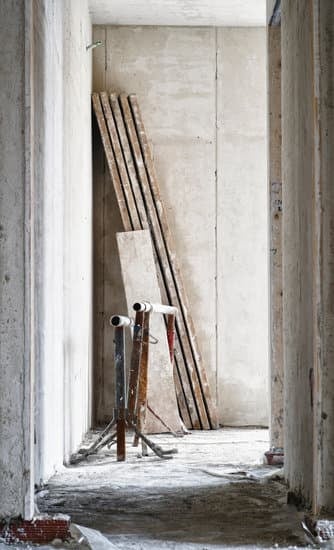What does a home improvement license cover? Homeowners often wonder about the scope and limitations of a home improvement license when hiring contractors for renovation projects. In this article, we will explore the purpose of a home improvement license, the process of obtaining one, what qualifies as home improvement work, and the legal requirements and regulations for license holders.
A home improvement license is a crucial aspect of ensuring that contractors are qualified to perform renovation or construction work on residential properties. It not only protects homeowners from shoddy workmanship but also ensures that contractors adhere to legal and safety standards.
Understanding the purpose of a home improvement license is important for both homeowners and contractors. For homeowners, it provides peace of mind knowing that the contractor they hire has met certain qualifications and standards. For contractors, it sets them apart as professionals in their field and can lead to more business opportunities. Let’s delve deeper into the world of home improvement licenses to gain a better understanding of their coverage and importance.
Understanding the Purpose of a Home Improvement License
A home improvement license is a necessary requirement for contractors and individuals who wish to undertake projects that involve modifying, renovating, or repairing residential properties. The purpose of a home improvement license is to ensure that the person carrying out the work has the required skills, knowledge, and experience to perform the job safely and effectively.
By obtaining a home improvement license, contractors are held accountable to certain standards and regulations that are in place to protect homeowners and their properties.
The main purpose of a home improvement license is to protect consumers from unqualified or unscrupulous contractors who may not have the proper training or expertise to handle home improvement projects. This means that anyone working on a residential property must hold a valid home improvement license in order to legally perform any type of remodeling or renovation work.
This also gives homeowners peace of mind knowing that they are hiring someone who has met certain professional requirements and is committed to following industry standards and best practices.
In addition, a home improvement license serves as a form of accountability for contractors and provides recourse for homeowners if something goes wrong with their home improvement project. If the contractor fails to meet their obligations or does subpar work, homeowners can file complaints with the licensing board, which can lead to disciplinary actions against the contractor’s license. Therefore, understanding the purpose of a home improvement license is crucial for both contractors and homeowners undertaking renovation or remodeling projects.
The Process of Obtaining a Home Improvement License
Obtaining a home improvement license is an essential step for anyone looking to start their own business or work as a contractor in the home improvement industry. The process typically involves several key steps and requirements that individuals must fulfill in order to become licensed. Here are the general steps involved in obtaining a home improvement license:
1. Research the Requirements: The first step in obtaining a home improvement license is to research the specific requirements set forth by the state or local government where you plan to work. Each jurisdiction may have its own set of rules, regulations, and qualifications for obtaining a license.
2. Complete Necessary Training or Education: Many states require individuals to complete a certain number of hours of training or education related to home improvement work before they can apply for a license. This may include coursework in areas such as construction methods, building codes, safety regulations, and business practices.
3. Submit an Application: Once the necessary training or education has been completed, individuals can then submit an application for a home improvement license. This process typically involves providing proof of education or training, passing an exam, submitting to a background check, and paying any required fees.
Successfully completing these steps will allow individuals to obtain their home improvement license and legally perform work within their designated area of expertise. It is important to note that failing to obtain the proper licensing could result in legal consequences and penalties, so it is crucial for individuals to adhere to all requirements set forth by their local jurisdiction.
What Qualifies as Home Improvement Work
Home improvement work can encompass a wide range of activities aimed at enhancing the functionality, aesthetics, and value of a residential property. Generally, home improvement work includes any project that involves altering, remodeling, repairing, or adding to a home. This can include tasks such as kitchen and bathroom renovations, roofing repairs or replacement, room additions, plumbing and electrical work, flooring installation, and landscaping.
In addition to these common examples of home improvement work, other projects such as fence installation, window replacement, and HVAC system upgrades also fall under this category. It is important to note that the specific definition of home improvement work may vary by state or locality. Therefore, it is crucial for homeowners to familiarize themselves with the regulations governing home improvement work in their area before undertaking any such projects.
Overall, understanding what qualifies as home improvement work is essential for both contractors and homeowners. Contractors must ensure that they are properly licensed to perform such work in their jurisdiction, while homeowners should be aware of the scope of projects that require a licensed professional for compliance with local regulations.
By having a clear understanding of what falls under the umbrella of home improvement work, individuals can ensure that they are adhering to legal requirements and receiving quality services for their residential projects.
| Example | Description |
|---|---|
| Kitchen renovation | Remodeling or upgrading an existing kitchen space |
| Roof repair | Fixing damages or leaks on a residential roof |
| Flooring installation | Laying down new flooring materials such as hardwood or tile |
Scope of Work Covered by a Home Improvement License
Interior Work
A home improvement license typically covers a wide range of interior improvements, including but not limited to electrical and plumbing work, HVAC installations, kitchen and bathroom renovations, flooring installation, and interior painting. This means that any licensed contractor can legally perform these types of improvements in your home.
It is important to note that certain states may have specific regulations regarding which types of interior work are included in a home improvement license, so it’s crucial to check your local requirements.
Exterior Work
In addition to interior improvements, a home improvement license may also cover various exterior work such as roofing installations and repairs, siding installations, window replacements, landscaping projects, and deck or patio construction. However, it’s essential to verify whether the contractor holds the appropriate license for any exterior work being done on your property.
Small-Scale Projects
Many home improvement licenses also allow contractors to take on small-scale projects such as minor repairs, maintenance work, and cosmetic upgrades. These projects may include fixing leaky faucets, replacing cabinet hardware, installing new light fixtures, or repairing drywall. While these projects may seem minor compared to larger renovations, having a licensed professional ensures that the work is done correctly and up to code.
When planning any home improvement project, it’s crucial to understand the scope of work covered by a home improvement license. By hiring a licensed contractor for the specific type of work needed in your home, you can ensure that the project is completed safely and in compliance with local building codes and regulations.
Differences Between a General Contractor License and a Home Improvement License
When it comes to home improvement projects, it’s crucial to understand the differences between a general contractor license and a home improvement license. A general contractor license typically allows the holder to oversee a wide range of construction projects, including new construction, remodeling, and renovations. On the other hand, a home improvement license is more specific and is tailored towards smaller-scale residential projects.
The requirements for obtaining these licenses also differ. In general, a general contractor license may require more extensive experience, education, and examination compared to a home improvement license. This is because general contractors are expected to have the knowledge and expertise to manage larger and more complex construction projects.
Another key difference lies in the scope of work covered by each type of license. While a general contractor can take on various types of construction work, a home improvement license typically restricts the holder to smaller-scale projects such as kitchen or bathroom remodeling, roofing repairs, or window installations. Understanding these differences is essential for homeowners who want to ensure that they are hiring the right professional for their specific needs.
| General Contractor License | Home Improvement License |
|---|---|
| Allows oversight of large-scale construction projects | Restricts holder to smaller-scale residential projects |
| May require more extensive experience and education | Requirements may be less stringent |
| Covers various types of construction work | Restricts holder to specific types of home improvements |
Legal Requirements and Regulations for Home Improvement License Holders
When it comes to home improvement projects, it is crucial for contractors to adhere to legal requirements and regulations. Holders of a home improvement license must ensure that they comply with all applicable laws and regulations in order to operate within the bounds of the law. This includes obtaining the necessary permits and licenses for specific projects, following safety regulations, and meeting building code requirements. Failure to do so can result in penalties, fines, or even legal action.
In addition, home improvement license holders are typically required to carry liability insurance and workers’ compensation coverage. This is intended to protect both the contractor and the homeowner in the event of property damage or injuries sustained on the job. Compliance with insurance requirements not only ensures protection for all parties involved but also demonstrates a level of professionalism and responsibility on the part of the contractor.
Furthermore, there may be specific regulations regarding advertising, contracts, warranties, and dispute resolution processes that home improvement license holders must follow. By understanding and abiding by these legal requirements, contractors can build trust with clients, uphold their reputation in the industry, and most importantly, ensure that their work meets high standards of quality and safety.
The Benefits of Hiring a Licensed Home Improvement Contractor
When it comes to home improvement projects, hiring a licensed contractor can make all the difference in ensuring the success and quality of the work being done. There are several benefits to hiring a licensed home improvement contractor, including:
- Legal Compliance: Licensed contractors are required to adhere to specific regulations and building codes set by local authorities. This ensures that the work being done meets safety standards and is up to code.
- Quality Workmanship: Contractors who hold a valid license have undergone training and have the necessary experience to perform home improvement work to a high standard. This can provide homeowners with peace of mind knowing that their project is in capable hands.
- Consumer Protection: Hiring a licensed contractor often includes protections for consumers, such as access to dispute resolution mechanisms or compensation funds in case of unsatisfactory work.
In addition to these benefits, hiring a licensed home improvement contractor also means that they have the appropriate insurance coverage in case of accidents or damages during the project. This shields homeowners from liability and financial burden should anything go wrong. Ultimately, choosing a licensed contractor for home improvement projects can save time, money, and stress in the long run.
While some homeowners may be tempted to hire unlicensed contractors due to lower costs, it’s important to weigh the risks and potential consequences. By opting for a licensed professional, homeowners can ensure that their investment in their home is protected and that the work will be completed safely and according to industry standards.
Overall, understanding the benefits of hiring a licensed home improvement contractor reinforces the importance of verifying licensure before beginning any projects. Whether it’s through references, online databases, or direct inquiries with licensing boards, taking this step can help homeowners make informed decisions and achieve successful outcomes for their home improvement endeavors.
Common Misconceptions About Home Improvement Licenses and Coverage
Myth: Any Contractor Can Perform Home Improvement Work
One common misconception about home improvement licenses is that any contractor can perform home improvement work without the proper licensing. In reality, many states require contractors to hold a specific home improvement license in order to legally perform certain types of work on residential properties. This includes tasks such as remodeling, plumbing, electrical work, and HVAC installations. It’s important for homeowners to verify a contractor’s license before hiring them for any home improvement project.
Myth: All Home Improvement Licenses Are the Same
Another misconception is that all home improvement licenses are the same across different states and jurisdictions. The truth is that licensing requirements can vary significantly from one location to another. Some states may have very strict regulations and testing requirements for obtaining a home improvement license, while others may have more lenient rules. It’s crucial for both contractors and homeowners to understand the specific licensing requirements in their area in order to ensure compliance with local laws.
Myth: Home Improvement Licensing Offers Unlimited Coverage
Contrary to popular belief, having a home improvement license does not automatically provide unlimited coverage for all types of work. While a license demonstrates that a contractor has met certain qualifications and standards, it does not necessarily guarantee expertise in every aspect of home improvement. It’s important for homeowners to thoroughly research potential contractors and verify their experience, skills, and areas of specialization before hiring them for a specific project.
Conclusion
In conclusion, obtaining a home improvement license is crucial for both contractors and homeowners. It ensures that the person hired to complete home improvement work is qualified, knowledgeable, and abides by legal regulations and requirements. By verifying a contractor’s license, homeowners can have peace of mind that the work will be done professionally and in compliance with industry standards.
Furthermore, understanding the scope of work covered by a home improvement license is essential. It encompasses a wide range of projects such as remodeling, renovations, repairs, installations, and more. This means that licensed contractors have the expertise to handle various aspects of home improvement work, making them reliable and trustworthy professionals.
Lastly, it is important to dispel any misconceptions about home improvement licenses. Some may believe that a general contractor license is interchangeable with a home improvement license, but they are distinct and cover different types of work. Homeowners should also be aware of the legal requirements and regulations for home improvement license holders in their area to ensure compliance with local laws.
In summary, homeowners should prioritize verifying a contractor’s license for any home improvement project. This not only guarantees quality work but also protects them from potential risks or liabilities. By hiring a licensed professional, homeowners can have confidence in the outcome of their home improvement endeavors.
Frequently Asked Questions
What Does a Louisiana Home Improvement License Cover?
A Louisiana Home Improvement License covers the legal authorization to perform any work that involves repairing, adding to, or altering residential property. This includes activities such as painting, roofing, plumbing, electrical work, and other similar tasks. Contractors and home improvement professionals in Louisiana must have this license in order to legally conduct their businesses.
What Is the Law for Home Improvement in NY?
In New York, the law for home improvement requires contractors performing home improvement work to have a Home Improvement Contractor (HIC) license if they are working on residential properties. This is a legal requirement designed to protect consumers and ensure that contractors meet certain standards of competence and reliability.
The law also provides specific protections for consumers in terms of written contracts, project timelines, and payment terms.
What Is the Easiest Contractors License to Get?
The easiest contractor’s license to get can vary depending on state regulations and individual circumstances. Some states may have less stringent requirements for certain types of licenses or may offer a streamlined application process under specific conditions.
However, it’s important for contractors to research the licensing requirements in their area carefully and choose the license that aligns with their particular skills and areas of expertise in order to operate legally and effectively within their industry.

I’m thrilled to have you here as a part of the Remodeling Top community. This is where my journey as an architect and remodeling enthusiast intersects with your passion for transforming houses into dream homes.





